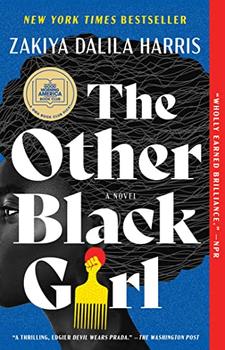Summary | Excerpt | Reviews | Beyond the book | Read-Alikes | Genres & Themes | Author Bio

Critics' Opinion:
Readers' Opinion:
First Published:
May 2022, 144 pages
Paperback:
May 2023, 144 pages
 Book Reviewed by:
Book Reviewed by:
Chloe Pfeiffer
Buy This Book
It's not about money. Kayleigh, the protagonist and narrator of We Had to Remove This Post, a newly translated novel from acclaimed Dutch author Hanna Bervoets, is saddled with credit card debt, working overtime and holidays at her museum job. Still, she keeps turning down offers from a lawyer, Mr. Stitic, who wants her to join his class action lawsuit against the social media company for which she used to work. As a content moderator, Kayleigh spent her workdays watching and assessing flagged material that featured violence and death, hate crimes, abuse, sexual content, etc.; now her former coworkers have PTSD, which doesn't surprise her. Technically, Kayleigh was a contract worker and worked for third-party company Hexa; the tech company that owns the site is never named, but it doesn't really matter, plus we can guess. Bervoets includes a list of selected sources from her research in the back of the book, most of which are about content moderators for Facebook and their lawsuit against the company (see Beyond the Book).
Kayleigh makes Stitic a deal—she'll tell him about her time at Hexa, and the mysterious reason she won't join his suit, if he promises not to contact her again. It's a little cheap, as plot devices go, but the direct address to Stitic gives Kayleigh's narration a welcome edge—an ambiguously directed anger—as she tells the story of Hexa. The working conditions are about what you'd expect in the contractor economy: timed bathroom breaks, expected metrics that are impossible to hit, low wages and no benefits, no mental health services for these workers who are seeing the worst of the worst of humanity for eight hours straight. These are jobs of exploitation and financial precarity. But unlike other recent novels that feature the workplace under late capitalism—I'm thinking of The Factory by Hiroko Oyamada, Severance by Ling Ma and The Employees by Olga Ravn, which all satirize the simultaneous life-consuming intensity, drudgery and absurdity of modern office life—WHTRTP is not really a commentary on work. There is a political bent, but it comes across as less about the exploitation of modern contract work and more about the ills of social media technology generally.
The book focuses on Kayleigh's romantic relationship with Sigrid, her coworker. However motivated Kayleigh thinks she is by money—needing to pay off her debt—it's clear that the stronger force, and the animating one of the novel, is libidinal. She speaks frankly of sex and her need for it from Sigrid. She's also outrunning the trauma of her previous relationship, with a manipulative ex-girlfriend who is unapologetically responsible for Kayleigh's heaps of credit card debt. (Kayleigh also speaks frankly of her ex; she's a frank person in general, although that doesn't mean she's not hiding something.) In this way, Bervoets makes Kayleigh's debt symbolic as well as literal: she wants to pay it off to escape the vestiges of her abusive relationship.
There's a darkness to Kayleigh and Sigrid's connection almost from the beginning. At first, it's just the sense that there is a mismatch of affections, and that this may be a repeat of Kayleigh's previous relationship. But it's deeper and more disturbing than that. Sigrid and Kayleigh are both affected by their work—the unrelenting bombardment of violence and cruelty, the insidious creep of conspiracy theories—in different ways, and both in ways that are invisible to themselves and baffling and unsympathetic to the other. Bervoets' narration is deft here, as is Emma Rault's translation from Dutch into English. Kayleigh's narrative voice is by turns cynical and naïve, sharp and hapless. The mood is unsettling as we barrel towards the big reveal of what really happened at Hexa.
WHTRTP is short, just 144 pages, with an easy and familiar structure: the frame of the flashback; the penultimate scene in which our questions are answered; the strange, ambiguous coda that leaves the reader with a twinge of melancholy. It reminded me more of a short story than a novel, partly because of this formulaic structure and partly because the book is a straight shot from A to Z, without a lot of rambling or extraneous detail.
The length, however, makes its characterizations that much more impressive. Kayleigh's coworkers at Hexa, who appear in only a handful of long scenes, are interesting on their own terms, sympathetic but not pathetic, brimming with barely acknowledged anger, and as screwed up by their jobs as Kayleigh and Sigrid are. Kayleigh is a deceptively compelling protagonist and narrator—at times she seems pure id, motivated by sex and desire, vulnerable without seeming to realize it. As readers, we want her to open her eyes and clearly see the ways in which she has settled for less than she deserves, the ways she and her life and relationship are damaged. But knowing the truth isn't always so great. If there's one thing Kayleigh and her coworkers don't need, it's exposure therapy.
![]() This review was originally published in The BookBrowse Review in June 2022, and has been updated for the
June 2023 edition.
Click here to go to this issue.
This review was originally published in The BookBrowse Review in June 2022, and has been updated for the
June 2023 edition.
Click here to go to this issue.

If you liked We Had to Remove This Post, try these:

by Zakiya Dalila Harris
Published 2022
Urgent, propulsive, and sharp as a knife, The Other Black Girl is an electric debut about the tension that unfurls when two young Black women meet against the starkly white backdrop of New York City book publishing.

by Patricia Lockwood
Published 2022
From "a formidably gifted writer" (the New York Times Book Review), a book that asks: Is there life after the internet?





The Flower Sisters
by Michelle Collins Anderson
From the new Fannie Flagg of the Ozarks, a richly-woven story of family, forgiveness, and reinvention.

The House on Biscayne Bay
by Chanel Cleeton
As death stalks a gothic mansion in Miami, the lives of two women intertwine as the past and present collide.

The Funeral Cryer by Wenyan Lu
Debut novelist Wenyan Lu brings us this witty yet profound story about one woman's midlife reawakening in contemporary rural China.
Your guide toexceptional books
BookBrowse seeks out and recommends the best in contemporary fiction and nonfiction—books that not only engage and entertain but also deepen our understanding of ourselves and the world around us.